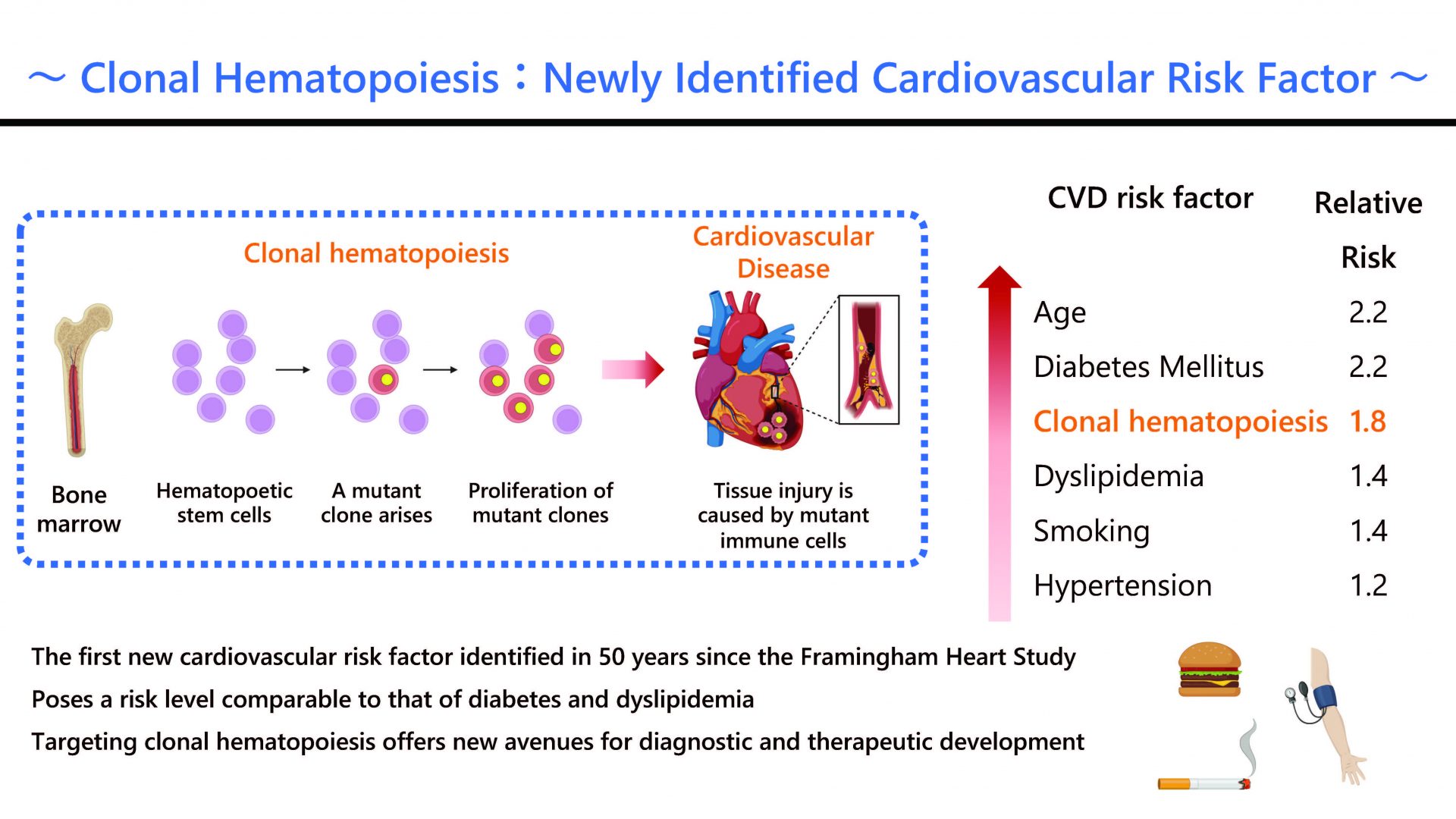Cardiology
Clonal hematopoiesis
Onco-Cardiology

YURA Yoshimitsu
Starting year 2025
Nagoya University
Nagoya University Hospital
Department of Cardiology
Assistant Professor
Research fields
Research Interests
Clonal hematopoiesis
Immunity
Cardiovascular disease
Professional Memberships
The Japanese Society of Internal Medicine
The Japanese Circulation Society
The Japanese Heart Failure Society
The Japanese Onco-Cardiology Society
Main research topics
Cardiovascular disease is a leading cause of death worldwide, including in developed nations, making it one of the most urgent challenges in modern medicine. The Framingham Heart Study in the 1960s showed that lifestyle-related conditions—such as hypertension, dyslipidemia, and diabetes—are major risk factors, and these have since been a primary focus in both routine health checks and clinical practice. However, carefully managing these factors does not always prevent cardiovascular disease, indicating that other underlying causes must be identified.
Recent large-scale clinical studies have highlighted “clonal hematopoiesis,” a phenomenon that occurs with aging, as an independent risk factor for cardiovascular disease. Clonal hematopoiesis involves the selective proliferation of hematopoietic stem cells (the cells that give rise to blood cells) carrying genetic mutations in the bone marrow. These mutations are passed on to the immune cells derived from these stem cells, altering their function. In fact, research shows that 10–20% of people over 70 may have clonal hematopoiesis, and it also becomes more common following cancer treatment. We have been at the forefront of investigating how clonal hematopoiesis contributes to cardiovascular disease. Specifically, mutated immune cells can travel through the bloodstream to the heart and blood vessels, causing inflammation and tissue damage that may lead to disease. This discovery marks a groundbreaking development in cardiology—the first of its kind in about half a century—and has garnered significant attention both in Japan and internationally.
This research has the potential to revolutionize diagnostic and therapeutic approaches by helping identify those most at risk for cardiovascular disease and advancing personalized medical treatments. Nevertheless, since this field is still in its early stages, many questions remain—for instance, how different genetic mutations exert varying effects and how best to control the proliferation and inflammatory processes of mutated cells. Looking ahead, I aim to address these challenges and ultimately contribute to better global health by integrating our growing understanding of clonal hematopoiesis into personalized medicine.
![]()


Representative papers
Yura Y, Miura-Yura E, Katanasaka Y, Min KD, Chavkin N, Polizio AH, Ogawa H, Horitani K, Doviak H, Evans MA, Sano M, Wang Y, Boroviak K, Philippos G, Domingues AF, Vassiliou G, Sano S, Walsh K. The cancer therapy-related clonal hematopoiesis driver gene Ppm1d promotes inflammation and non-ischemic heart failure in mice. Circ Res. 2021 Sep 3;129(6):684-698.
Cochran JD, Yura Y, Thel MC, Doviak H, Polizio AH, Arai Y, Arai Y, Horitani K, Park E, Chavkin NW,Kour A, Sano S, Mahajan N, Evans M, Huba M, Naya NM, Sun H, Ban YH, Hirschi KK, Toldo S, Abbate A, Druley TE, Ruberg FL, Maurer MS, Ezekowitz JA, Dyck JRB, Walsh K. Clonal Hematopoiesis in Clinical and Experimental Heart Failure With Preserved Ejection Fraction. Circulation. 2023 Oct 10;148(15):1165-1178.
Research URL
Researchmap Yoshimitsu Yura – My portal – researchmap
Global issues to be solved through this project
Clonal Hematopoiesis — A Game Changer in Cardiovascular Medicine: A Challenge from Bench to Bedside
In Japan, as in other developed countries, cardiovascular diseases such as myocardial infarction and heart failure account for approximately 30% of all deaths, making their prevention and treatment an urgent societal issue. While these diseases are primarily attributed to lifestyle-related conditions such as hypertension and dyslipidemia, and treatments for these risk factors have been implemented, they have not been sufficient to fully suppress disease onset and progression. I have previously reported that the expansion of hematopoietic stem cells harboring age-related somatic mutations—known as clonal hematopoiesis—is associated with the development of cardiovascular disease. In this project, I aim to translate these research findings into real-world applications by generating evidence in the Japan and developing a simplified method for detecting clonal hematopoiesis.
Interview
No interview
News
No related news

